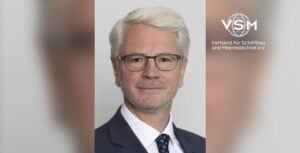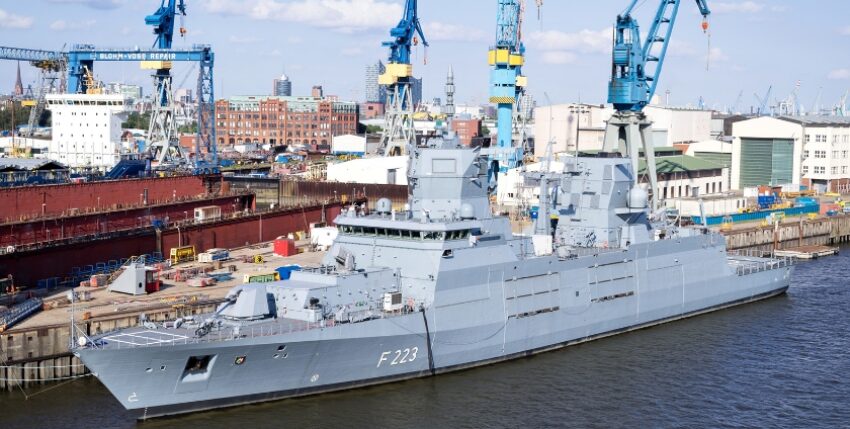Annual review 2024 of the German Shipbuilding and Ocean Industries Association (VSM)
The European shipbuilding industry is also participating to a significant extent in the rising global order volumes and increased investment in new construction. However, this positive message should not obscure the fact that China is increasingly dominating the market by realising government-defined targets.
Despite a weakening global economy and growing geopolitical tensions, the global shipbuilding industry continues to record strong demand and high capacity utilisation. The healthy earnings situation in most shipping markets is fuelling record levels of investment in newbuilds and further increasing the volume of orders worldwide. Business is also very successful again in the cruise sector. Booking data has now exceeded the pre-corona record levels. The major shipping companies are currently all in the market to further expand their fleets towards sustainability with state-of-the-art ships. The European industry in particular is benefiting from this. Shipyards and suppliers have proven time and again to be ideal partners thanks to their innovative strength in bringing the legendary creativity of architects to life. It is this combination that has made the cruise success story possible. CLIA Europe recently emphasised this explicitly in a remarkable publication entitled "Made in Europe": 97% of the cruise fleet were and are built in Europe. The European order book in this segment currently totals $ 57 billion, with a number of additional projects at an advanced stage of negotiation. Overall, a record order intake is expected for 2024.

Individual projects in Asia, on the other hand, have met with limited success, meaning that shipyards in Japan and Korea are currently showing little interest in this market segment. Due to the systemic risks in China, which are now considered to be considerable, this option is also not currently being pursued by the market leaders. In view of this situation (and also the statements on the structural risks in the global market that follow in the next paragraphs), there can be no doubt that government intervention to secure the future of Meyer Werft was sensible. The solution found was time-critical and therefore, from a certain point in time, without a viable alternative. Nevertheless, a bitter aftertaste remains, because as is so often the case in such cases, banks and consultants are the main beneficiaries of the high costs incurred by the "rescued" company. Nevertheless, the intervention should be worthwhile for the taxpayer. The state has acquired one of the most productive shipyards in Europe at a bargain price.
China's dominance and Europe's growing dependence
Nevertheless, securing the future was important and the right thing to do. Because as pleasing as the market development may be, it must not obscure the deeper structural challenges. With the exception of high-end ship types, the global shipbuilding industry is increasingly dominated by China, which is continuously expanding its market position with extensive government support. According to Clarksons Research, more than three quarters (!) of all shipbuilding orders had gone to China by the end of October. Many western shipping companies are following this development with an uneasy feeling, as they are well aware of the geostrategic risks. For commercial reasons, however, German shipowners also have little choice but to accept the extremely attractive pricing offered by Chinese shipyards, which is often accompanied by attractive conditions from state-controlled Chinese financial service providers. Medium-sized shipping companies in particular are increasingly reporting that Chinese shipyards with bulging order books are showing less and less willingness to fulfil the wishes of their customers, e.g. with regard to the makers list. The motto is often "eat or die" instead of "the best ship for the specific requirements".
Despite the high demand, the Clarksons price index shows that ships today are still offered at a lower average price than the absolute price level of 2008. 16 years of inflation, i.e. in China above all high increases in labour costs, seem to have vanished into thin air. In addition, ships today often contain significantly more expensive environmental technology in order to fulfil a wide range of stricter regulatory requirements. The Chinese are undercutting each other and so we are seeing that despite a legendary boom, no money is being made. And this is a phenomenon that can be observed in many sectors in China.
After decades of Europe advocating rules-based global free trade, it is clearly difficult to change course. While we are engaged in intensive discussions about the right balance between de-risking and de-coupling, the latter has long been taking place elsewhere, not only in Washington, but above all in Beijing itself. China has already been freeing itself from Western dependencies for 20 years. And in the USA in particular, a de-coupling process of unprecedented consequence is likely to begin on 20 January. Chinese exports that can no longer be sold in the USA due to new tariffs will then push even more strongly towards Europe. At the same time, American pressure to do the same will increase. Does Europe have an answer to this?
So far, however, investments in China have continued unabated, regardless of reports about the next escalation in the South China Sea, the next destroyed submarine cable in the Baltic Sea or Chinese-Russian defence cooperation. Incidentally, the Houthi attacks on Western ships also fit into the overall picture. Chinese or Russian ships are not affected.
Nevertheless, the composition of the new European Commission sends clear signals of a more consistent and self-confident Union. A Directorate-General for Defence has been set up for the first time. In her hearing, Kaja Kallas, the Union's High Representative for Foreign Affairs, no longer used the 2019 triad of China as a partner, competitor and rival, but emphasised the challenges and a consistent response to them. And Commissioner Šefčovič's portfolio is now no longer called trade, but trade and economic security.

A similar course adjustment has not yet been observed for Germany. The German government's China strategy from July 2023 sticks to the EU's 2019 triad, despite the alarming developments in the meantime. This document is therefore also symptomatic of the lurching course of the traffic light government, which proclaims a turnaround but only begins to implement it. Pointing to the plethora of failures from previous years is undoubtedly permissible, but is not sufficient to explain the lack of consistency in its own actions.
It is therefore hardly surprising that the break-up of the traffic light government was greeted with relief and applause in many places, including the SPD and FDP parliamentary groups. In view of the disgraceful theatre that was performed on 6 November and the days that followed, one must be grateful for the shortened election campaign period. It is much more important to return to full capacity for action as quickly as possible, because the coming months will be tough! The upcoming change of government in the USA already seems to be having an impact on conflicts and crises in many parts of the world. Unlike in 2017, President Trump is now much better prepared and has a solid majority in both chambers of parliament. The world has also already got to know him and is now trying to prepare itself as best it can. And now, of all times, the EU's two most important economies, Germany and France, are proving to be politically unstable.
This makes it all the more important for the Commission to get moving quickly. This also includes a core project of the European shipbuilding industry. After two years of intensive endeavour, a new maritime industrial strategy has been successfully written into the Commission's terms of reference. The German government's strong support for a corresponding resolution in the Council of Ministers was a decisive factor in this. While shipping has been the subject of various EU initiatives and formats over the past decade, such as the long-established "European Sustainable Shipping Forum", the Commission has lacked a clearly recognisable complementary strategy on how to strengthen the manufacturing maritime industry in Europe. This is now to be presented in the coming year, which can be described as overdue in view of the geopolitical situation. How else are we going to organise adequate equipment for our naval forces and security authorities; how are we going to shape the planned, ambitious expansion of offshore renewable energy generation; how are we going to ensure a modern, climate-neutral waterborne transport infrastructure for Europe - how are we going to guarantee all of this without becoming even more dependent on system rivals? The answer can only be an efficient maritime industry that grows again and establishes its production base on a broad basis.
Time is of the essence, especially in naval shipbuilding. The USA in particular is now very aware of the risk of not having an industrial base. The speed at which China has caught up with the formerly vastly superior US Navy is breathtaking. Since 2005, China has expanded its shipbuilding industry by the production capacity of the entire EU every two years. The shipbuilding industry in Europe is in an excellent technological position compared to the USA. The fact that there is still a significant target industry here is particularly helpful. Only together is there an ecosystem that generates high efficiency and innovative strength. In the USA, the US Navy has to feed the entire ecosystem virtually on its own.
That is why we want to strengthen both sides for Germany and complement them with an efficient marine technology industry. The VSM has summarised how this can be achieved in a 10-point programme. In the coming months, we will work to achieve the broadest possible support for our proposals so that a new German government can actively promote them at European level as quickly as possible once it has been constituted.
All these upheavals and current crises also harbour many opportunities for the German shipbuilding and marine technology industry. Especially at a time when the future of other industries is being called into question, we can point to enormous demand and therefore growth potential.
It is true that a successful future for the industry depends heavily on competitive framework conditions. However, it is also true that the strategic importance of the maritime industry has rarely been as clear as it is today.
Text: German Shipbuilding and Ocean Industries Association (VSM)
Steinhöft 11
20249 Hamburg
Phone: +49 - (0)40 - 28 01 52 36







